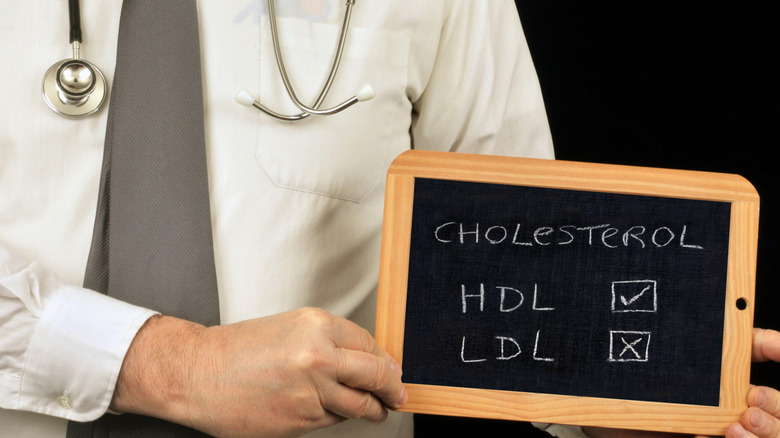The Underrated Vinegar That Can Lower Cholesterol And Protect You From Skin Cancer
The vinegar you choose could give you more than a flavor kick. It could also help you avoid certain medical conditions. In fact, one underrated vinegar can reportedly lower cholesterol as well as reduce the development of certain cancers: red wine vinegar.
To be sure, all vinegars may offer health advantages. A 2014 study in the Journal of Food Science noted that vinegars in general have antitumor and cholesterol-fighting effects. Why would red wine vinegar stand out in relation to cholesterol and cancer, then? The answer comes from its foundational ingredient, red wine. Since red wine vinegar begins as red wine, the two share some nutritional elements, notably resveratrol, a potentially protective compound, per WebMD.
Though the fermentation process that turns red wine into red wine vinegar reduces the amount of resveratrol in the finished product, some resveratrol survives. And according to a 2018 review in Biomedicines, resveratrol seems to provide antioxidant protection against cardiovascular problems and the development of cancerous tumors. But resveratrol isn't the only red wine vinegar nutrient that makes it a potentially functional food.
A natural way to lower cholesterol
Acetic acid, a byproduct of fermentation, plays a defining role in red wine vinegar's possible ability to reduce elevated cholesterol. Since all vinegars contain acetic acid, clinical explorations of any vinegar's relationship to improved cholesterol levels through acetic acid intervention are worth considering.
Case in point, a 2023 study in Frontiers in Clinical Diabetes and Healthcare investigated apple cider vinegar's impact on cholesterol in adult participants with diabetes. After ingesting vinegar daily for eight weeks, participants showed LDL "bad" cholesterol improvements, ostensibly because of the way acetic acid inhibits the way certain enzymes synthesize fat within the body based on previous animal studies.
In a 2010 study published in Lipids in Health and Disease, rabbits that were fed a high-cholesterol diet as well as given vinegar supplementation showed less cholesterol buildup than those who weren't. These results led researchers to surmise that consuming vinegar after a meal might be used as a cardioprotective therapy for those with elevated cholesterol. With that said, since the study was conducted on animals, its findings might not translate to human subjects.
A food to keep melanoma from developing
Let's switch over to examining red wine vinegar as a possible skin cancer prevention tool. Resveratrol seems to be a key driver of this red wine vinegar benefit, if clinical trials are any indication. For example, in a 2018 study in OncoTargets and Therapy, resveratrol was tested to see if it halted the proliferation of melanoma cells in laboratory conditions. Researchers found that it did, concluding that resveratrol might be useful in preventing or treating cases of melanoma.
In another 2018 study in the International Journal of Molecular Medicine, resveratrol was again heralded for its potential as a chemopreventative agent, particularly against malignant melanoma growth within a cancerous cell line. In fact, resveratrol seemed to suppress the expression of melanoma cells. However, like the previous study, this one was done under laboratory conditions rather than performed on animal or human subjects. Accordingly, resveratrol may work differently in real-world situations. Even so, red wine vinegar's potential cholesterol- and cancer-related benefits may be worth remembering the next time you reach for a vinegar.


